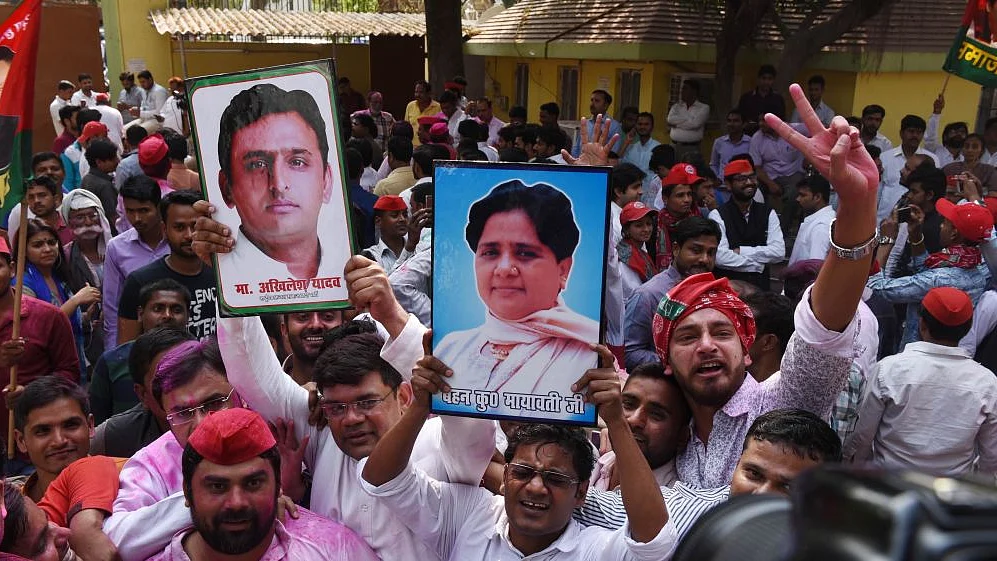Did Mandal politics trump BJP?
Consolidation of oppressed ‘castes’ should worry BJP because in the bypolls, castes treated as lower in the hierarchy sought to redress their grievance through democratic mobilisation

Has Mandal once again trumped Mandir? The results of the byelections in Uttar Pradesh and Bihar suggest that ‘caste’ has again surmounted the ‘communal’ divide that had helped BJP win the general election in 2014 and again win the assembly election in Uttar Pradesh. Bihar, in 2015, bucked the trend when Lalu Prasad embraced Nitish Kumar.
Media pundits in New Delhi have a flawed understanding of ‘caste politics’, pointed out political scientist Suhas Palshikar. “Given that caste is based on inequality, this (caste politics) was a natural development wherein castes treated as lower in the hierarchy, sought to redress their grievance through democratic mobilisation,” wrote Palshikar before adding that “caste politics (in this sense) is a necessity”.
It would be misleading to go with superficial analysis in TV studios and assume that logic and expediency of numbers alone brought together the Samajwadi Party and Bahujan Samaj Party (BSP) in UP. What is far more probable is that both the parties sensed the mood on the ground. Uttar Pradesh chief minister Yogi Adityanath’s record over the last one year would also have convinced them of the urgency of fighting the BJP together.
TV anchors and most viewers may have forgotten how Ajay Singh Bisht alias Yogi Adityanath refused to step into the chief minister’s official residence on Kalidas Marg before it was purified with cow’s milk and water from the holy river amidst chanting of vedic mantras and rituals. It would not have escaped the notice of SP and BSP leaders that the previous occupants were a Yadav, a Shudra and a Dalit.
As chief minister, Yogi’s first decision was to order the closure of almost all meat shops and slaughter houses in the state. Not just Muslims engaged in the trade but also the leather industry are yet to recover from the blow. The next step was to remove all or most Muslim, Dalit and OBC police officers from police stations and replace them with SHOs belonging to Thakurs, Bhumihars and Brahmins, the upper castes. They were given a free hand to go after crime and criminals. The result has been somewhat interesting.
In less than a year, Uttar Pradesh Police claims to have gunned down 38 people in as many as 1,142 encounters. Not a single one of them is from forward castes. It is worth recalling that Thakurs, reportedly, in several parts of Uttar Pradesh went berserk after Yogi Adityanath assumed charge as chief minister. They had stormed police stations and dragged out Dalit, OBC and Muslim police officers before assaulting them in public view, recording the beating and gleefully sharing the videos on social media and WhatsApp groups. Even district magistrates and district police chiefs were not spared and the residence of some of them were ransacked.
Allegedly, no action was taken against the culprits though. In Saharanpur, the Thakurs who attacked the Dalits and burnt their houses are moving freely but a Dalit youth, founder of a social organisation unfortunately “and misleadingly named the ‘Bhim Army’ , and who was not even present when the clash took place, was arrested and continues to languish in prison, charged with sedition and with bail denied.
In Bihar too a similar scenario played out as soon as Nitish Kumar abandoned the ‘grand alliance’ (Mahagathbandhan) and embraced the BJP. General lawlessness and communal violence have reared their heads in Bihar, affecting the poor and Muslims the most. Nitish Kumar’s draconian prohibition drive has also affected the poor the most. A flourishing illicit liquor trade and bootlegging have generated black money that lines the pockets of policemen and politicians.
All this helps explain why the oppressed classes came together to defeat BJP in the byelections. If the consolidation of ‘Mandal’ forces continue in UP and Bihar, BJP will be in for some unpleasant surprises in the next round of elections there.
Follow us on: Facebook, Twitter, Google News, Instagram
Join our official telegram channel (@nationalherald) and stay updated with the latest headlines
- Nitish Kumar
- Uttar Pradesh
- BSP
- Bahujan Samaj Party
- Prohibition
- Samajwadi Party
- Dalit
- Lalu Prasad Yadav
- OBC
- Muslim
- SP
- Kalidas Marg
- Yogi Adityanath
- Thakurs
- Brahmins
- Bhim Army
- SP-BSP alliance
- Mandal
- caste politics
- Bhumihars
